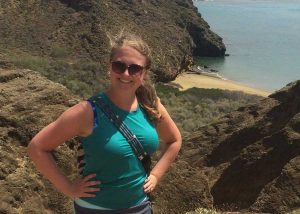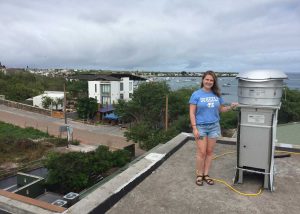Tessa Szalkowski
Tessa Szalkowski ’20 is a Chemistry major who participated in the Galapagos Study Abroad program in Summer 2017.

Why did you choose to study abroad in the Galapagos?
I chose to study abroad in the Galapagos because I wanted a once-in-a-lifetime experience in a completely unique environment. I wanted the opportunity to be immersed in a new culture, learn about rare marine fauna, and scuba dive amongst these creatures.
What was the most interesting cultural experience you had abroad?
The most interesting cultural experience I had was learning about the passion for the environment that the locals have. The local residents of the island have great awareness and love for the plants and animals of the island, unlike anything I have ever seen in the United States. My host family and tour guides expressed to me many times that the sea lions, turtles, and other wildlife arrived to the island well before humans so we must treat them with the utmost respect. With this mindset, the Galapagos population has maintained a pristine environment that visitors can explore and appreciate.
How did your summer experience impact the way you view the world?
I had never visited an environment that was so untouched by humans. The locals’ dedication to preserving their environment inspired me to maintain these same practices and spread awareness. I reduced my consumption of single-use plastics and encouraged my peers to do the same. The habits I adopted in the Galapagos have changed my everyday life.
What piece of advice would you give a fellow student who is considering studying abroad in the Galapagos?
Get your scuba diving license before you go! Diving in the Galapagos was one of the best choices I made while I was down there. I got to see sharks, sea turtles, a multitude of unique fish, and so many other cool sea creatures.
What classes did you take while in the Galapagos?

MASC 490: “Marine Ecology of the Galapagos”
ENVR 296: “Climate Change and Atmospheric Aerosols”
Describe a typical day for you in the Galapagos.
My classmates and I would attend class in the morning, and we would have the rest of the afternoon to explore! I would complete our class readings on the beach and then snorkel in Darwin Bay, a secluded spot not far from the school. I would then return to my host family’s house to eat dinner with them and prepare for the next day.
If you could only pack 3 things in your suitcase to prepare you for the Galapagos, what would they be?
I would bring sunscreen, a bathing suit, and good hiking sandals/boots. You never know when you’ll take an impromptu hike or dip in the ocean. You have to be prepared to get your feet wet or shoes a little muddy.
